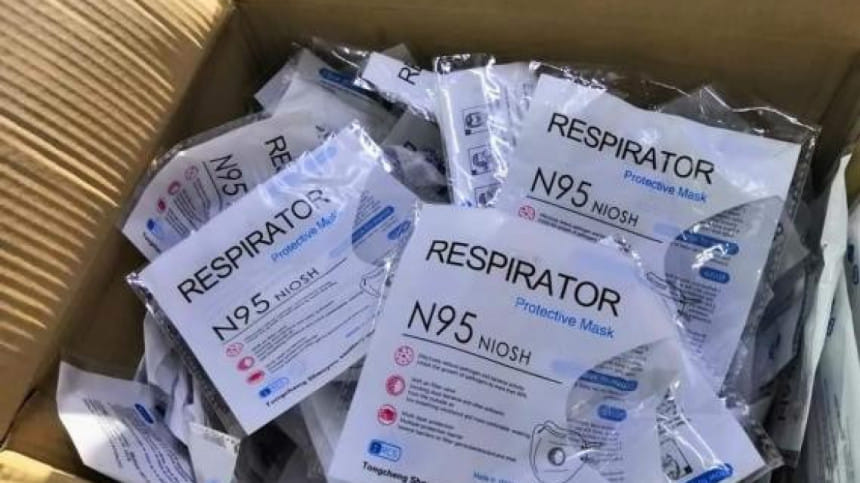Mask Mess-Up Probe body goes soft

No action against the supplier has been recommended following a government probe into the alleged supply of regular masks packaged as N95 ones to various hospitals.
The controversy over the mask supply came to the fore in early April when health professionals in various hospitals were questioning the quality of respirators, with some resorting to social media to vent their frustration.
With the complaints over poor-quality respirators surfacing, the Central Medical Store Depot (CMSD), the government body that sources medical supplies, withdrew the masks received from JMI Hospital Requisite MFG Ltd.
It also served a show-cause notice to the company.
In an official statement, JMI then said it was a packaging mistake.
Later, a government probe body has found that JMI supplied "research-stage N95 masks" manufactured with "unapproved imported raw materials" against the demand for regular ones.
But it did not say what steps should be taken against the supplier.
The Daily Star has obtained the summary of the probe report, submitted to the health ministry on April 27, which is yet to be made public.
The Health Services Division formed the probe committee on April 19, the day before Prime Minister Sheikh Hasina in a video conference expressed her annoyance over the PPE and face-mask controversies.
The committee, headed by M Saidur Rahman, additional secretary (development) to the Division, was asked to submit the report within three days. Later it was given seven more days.
THE REPORT
The probe body made three recommendations.
Firstly, the committee said, it is necessary to take action against the officials concerned who received the mask delivery without informing the director of CMSD, even after suspecting that those were not genuine N95 masks.
Secondly, skilled manpower has to be increased to identify the demand and distribution process of personal protective equipment (PPE).
Thirdly, the authority concerned needs to be more cautious in approving, manufacturing and marketing N95 masks, it said.
In the opinion part of the summary report, the committee also mentioned three points.
"The company supplied research-stage N95 masks against the demand of regular ones; the supplied research-stage N95 masks were manufactured with unapproved imported raw materials, and the CMSD director directed the supplier to give explanation and take back the products."
The Daily Star shared a copy of the undisclosed report with Bangladesh Medical Association's Secretary General Ehteshamul Haque Chowdhury.
He said the report is not substantial.
"This report may have aimed to allow someone to escape. None was held responsible or accountable specifically in this report."
Ehteshamul, a former director of DGHS (admin), also said, "In my long career, I have never seen such a type of report. The message is not clear in the report."
The Daily Star approached several health ministry officials about the probe report, but they declined to make any comment.
Contacted on June 10, the probe committee head, M Saidur Rahman, said, "The committee has submitted the report within the stipulated timeframe, and I will not say anything about the content of the report."
When told that The Daily Star has obtained a copy of the probe report and that the committee did not recommend any punishment against the supplier, he said: "I will not say anything about the content. You claimed you have got the report. So, you know everything. Then why are you embarrassing me asking such a question?"
The government transferred the CMSD director last month, and health secretary and another additional secretary of the health ministry earlier this month.
JMI Managing Director Md Abdur Razzaq in April issued a press statement saying they had started the process of manufacturing masks of N95 standard. The initiative would have been at the final stage by now if there was no global lockdown due to the pandemic.
"When any product is at the stage of research and development [R&D], we prepare cartons, packets and leaflets in advance... If the product does not get approval, we destroy those cartons or packets."
JMI employees mistakenly supplied 20,600 regular masks in N95 packets kept for R&D, he said.
"We did not notice it and we did not even submit any bill for N95. So, we did not get any work order for N95 masks and we did not supply any such," he said.
No official of the JMI could be contacted for comment on the latest developments.
In late April, the then CMSD director Shahidullah told this newspaper that JMI was not supposed to supply N95 masks.
He also said JMI had long been supplying surgical masks. The company was asked to supply regular surgical masks and they delivered accordingly, but wrongly labelled those as N95.
WHAT IS N95, ACTUALLY?
Experts say an N95 mask is a particulate-filtering face-piece respirator that meets the "N95 classification" of the US National Institute for Occupational Safety and Health (NIOSH) for air filtration, meaning it filters at least 95 percent of airborne particles.
In other words, N95 means a respirator that blocks at least 95 percent of very small -- 0.3 micron -- airborne particles. A micron is one-millionth of a metre, and viruses are in the range of 0.3 microns.
However, types of N95 masks vary from one manufacturer to another.
Since Covid-19 was first detected in the Chinese city of Wuhan in December last year, and subsequently spread across the world including to the United States and Europe, N95 masks have become scarcer and pricier.
On the other hand, FFP2 masks are European and KN95 are Chinese standard for respirators.
Prof Muzaherul Huq, former adviser (Southeast Asia Region) at the World Health Organisation, earlier told The Daily Star, "As we failed to collect N95 masks, we have to accept the KN95 and FFP2 masks."
"But we have to ensure that the quality is checked."

 For all latest news, follow The Daily Star's Google News channel.
For all latest news, follow The Daily Star's Google News channel. 




Comments